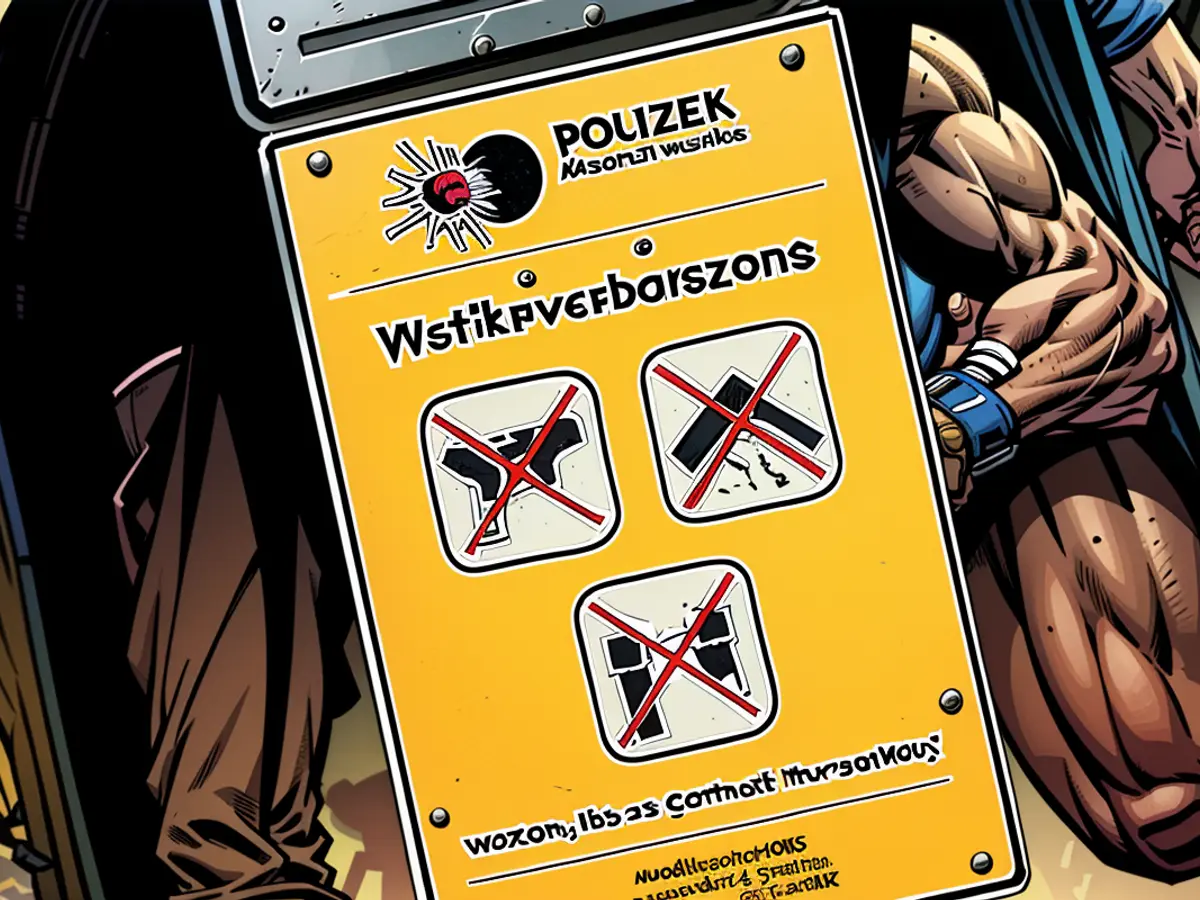The efficacy of designated gun-free zones: an inquiry.
City restrictions on weapons aim to curb violent crime, but their effectiveness is questionable. While some cities like North Rhine-Westphalia heavilyemphasize this approach, others, such as Leipzig, are scrapping the ordinance. Neighbors can sometimes face disadvantages too.
Images of firearms, switchblades, batons, and pepper spray are common sights in many German major cities' weapon-restricted zones. Politicians hold high hopes for this solution. For instance, Federal Chancellor Olaf Scholz suggested expanding such zones after a knife attack in Mannheim left a police officer dead. But does city safety truly improve this way?
The criminological outlook is uncertain, and the data foundation is thin, as Martin Rettenberger explained to ntv.de. "First, one ought to consider the initial situation in a specific district and evaluate whether weapon violence is indeed the main issue that requires resolution there," says the Director of the Criminological Central Office.
The establishment of weapon-restricted zones is governed by the Weapons Law and Police Laws. They amplify the Weapons Law and bar weapons whose carrying isn't inherently penalized or limit the allowed blade length of knives. The specifics vary from location to location, with even glass bottles banned in some areas, like St. Pauli district in Hamburg. These zones can be temporarily set up, like during large events, or permanently apply to specific streets, spots, or neighborhoods. Yet, exceptions exist. For example, the Old Town of Düsseldorf is a weapon-restricted zone only on weekends and holidays.
"A sign does little good"
The knife attack in Mannheim occured in a weapon-restricted zone, but it was limited to evening and night hours and weekends. The incident happened during the daytime. A determined violent individual might not be deterred by a weapon-restricted zone. "Putting up a sign somewhere makes little sense," says expert Rettenberger. In fact, extensive weapon-restricted zones augment the police's power. Officers can perform checks without suspicion. In instances of violation detection, a fine of up to 10,000 Euro looms. Thus, police presence is essential for these zones to function.
The first weapon-restricted zone was declared in Hamburg in 2007, and numerous major cities have followed suit since then. In North Rhine-Westphalia, the measure has been in use since 2021, introducing a total of four weapon-restricted zones in Düsseldorf and Cologne. After a year, Interior Minister Herbert Reul took stock: During 17,191 checks, 349 weapons and knives were found, and 744 individuals were detained. "This arsenal is the impressive response to those who may have wondered whether weapon-restricted zones aid the safety of our urban centers," he said.
Recently, a permanent weapon-restricted zone was added in Cologne-Mülheim. "I don't believe that a weapon-restricted zone is a solution for all cases. It is a mosaic stone," said Reul. "Every knife we remove from traffic can no longer hurt anyone - and that's good." The police in other federal states like Bremen, Lower Saxony, Hesse, and Baden-Württemberg reportedly had positive experiences with this tool.
However, in Berlin, identifying suitable locations for weapon-restricted zones is challenging, said Police President Barbara Slowik in an interview with ntv.de. Regarding knife violence, police presence was distributed across the entire urban area. "We see individual focus areas, some of which are in crime-ridden areas where we can already search without cause," Slowik said. "We keep such weapon-restricted zones open, but nothing is specifically planned at the moment."
The most comprehensive evaluation of a weapon-restricted zone comes from Leipzig. Since 2018, weapons, knives, pepper spray, and other dangerous items have been banned in the area around Eisenbahnstraße. Increased police presence was intended to enhance security in the area, perceived as a crime hotspot in the Saxon city.
According to the 2021 Leipzig study, the weapon-restricted zone led to reducing publicly committed armed attacks. However, the overall crime rate and its causes did not significantly decline sustainably. The number of crimes remained at a "continued, high level." Even from the Leipzig Police Headquarters, it is now said: "The weapon-restricted zone is unnecessary from our perspective." The number of altercations has not changed. The city council has passed a resolution to abolish the weapon-restricted zone, replacing it with a permanent police station.
Rettenberger warns of both criminal and subjective effects. "If the sense of security of the residents improves through weapon-restricted zones, then that's a positive effect." At the same time, the opposite can occur. "Weapon-restricted zones can contribute to the stigmatization of a neighborhood," so the expert. "People in the Leipzig study also reported that the reputation of their living area had worsened."
The feeling of constant surveillance can negatively affect the quality of life, says Rettenberger. This particularly affects young men. "They have the highest criminal risk, but in both directions: becoming perpetrators as well as victims," Rettenberger added. Additionally, there is the risk of racial profiling, meaning that certain ethnic groups may be searched based on their appearance.
Eventually, it's all about striking a balance between protection and liberty, asserts the authority. There's no foolproof strategy that yields immediate benefits without any drawbacks. Rettenberger stresses the importance of a nuanced discussion, with the police, locals, and political leaders all present. "The discussion surrounding gun-free zones requires patience and a measured approach.", he adds.
Read also:
- Despite the implementation of weapon-restricted zones in cities like North Rhine-Westphalia, knife attacks, such as the one in Mannheim, continue to occur, raising questions about their effectiveness.
- Leipzig, a city that previously had a weapon-restricted zone, has decided to abolish it, citing that it has not significantly reduced overall crime levels or the number of altercations.
- Following the knife attack in Mannheim, Federal Chancellor Olaf Scholz suggested expanding weapon-restricted zones, but experts like Martin Rettenberger argue that the initial situation in a specific district should be considered before implementing such measures.
- Germany's neighboring countries, such as Belgium and the Netherlands, have also implemented international knife control measures, highlighting the global discourse on weapons and violence reduction strategies.






